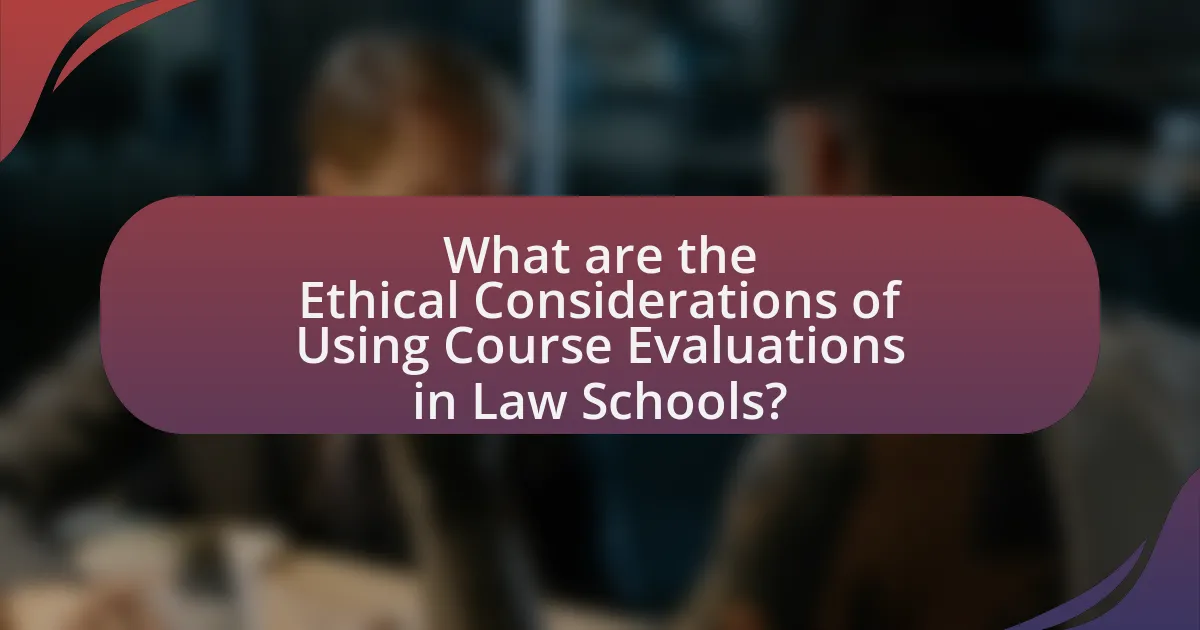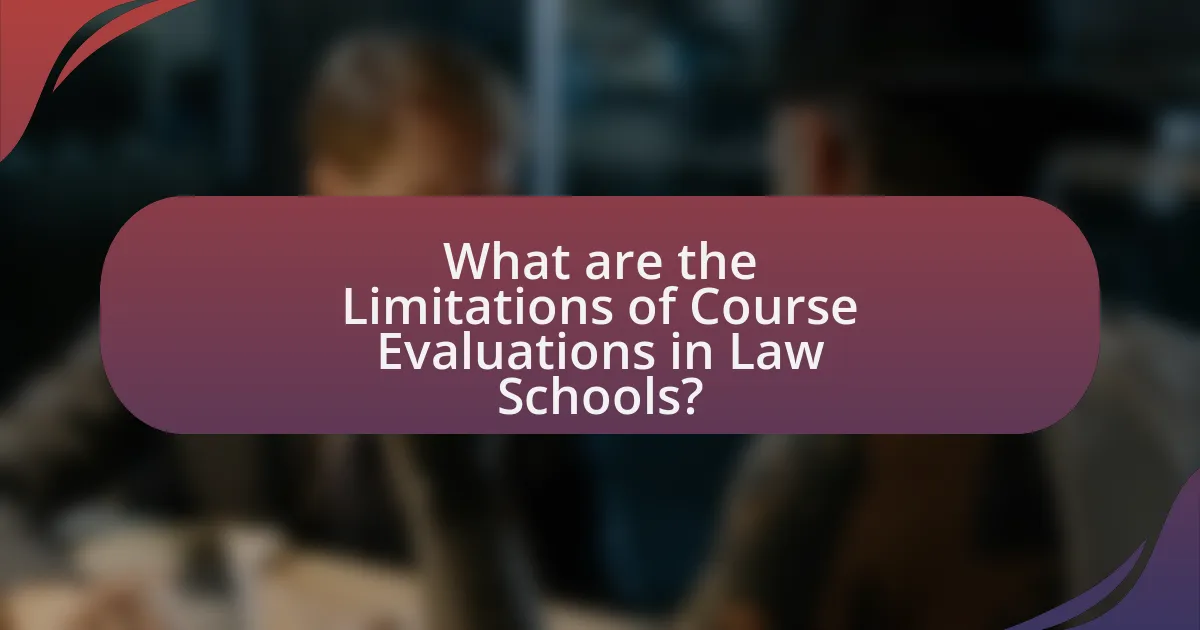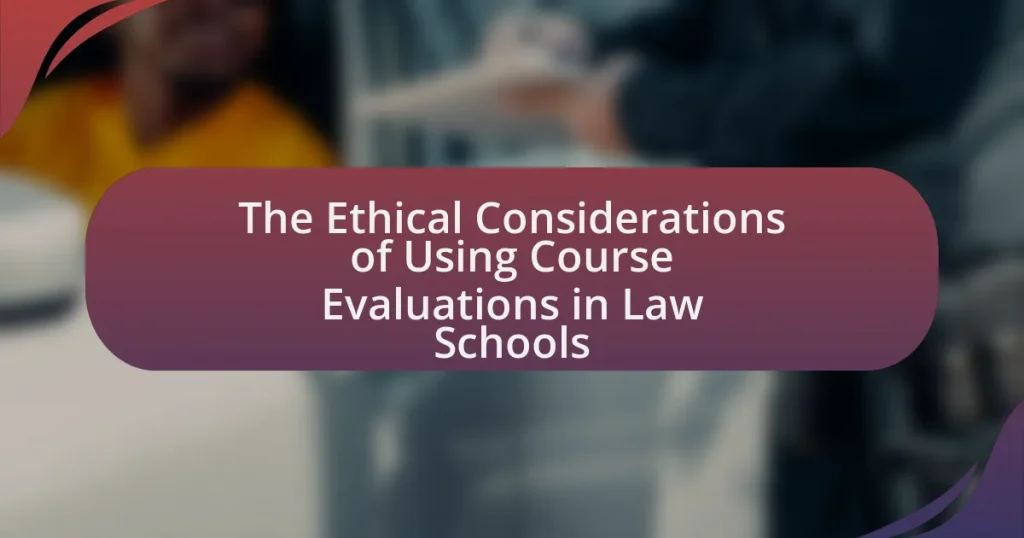The article examines the ethical considerations surrounding the use of course evaluations in law schools, highlighting issues such as bias, the impact on teaching practices, and the validity of feedback. It discusses how biases related to gender, race, and instructor attractiveness can skew evaluation results, leading to unfair assessments of faculty performance. Additionally, the article emphasizes the importance of course evaluations in providing feedback for teaching effectiveness and student learning outcomes, while also addressing the limitations and criticisms of current evaluation methods. It suggests best practices for improving fairness and accuracy in evaluations, including the implementation of standardized criteria and anonymous feedback mechanisms.

What are the Ethical Considerations of Using Course Evaluations in Law Schools?
The ethical considerations of using course evaluations in law schools include potential biases, the impact on teaching practices, and the validity of the feedback provided. Biases can arise from factors such as gender, race, and perceived attractiveness of instructors, which may skew evaluation results and unfairly affect faculty assessments. Research indicates that evaluations often reflect student satisfaction rather than actual teaching effectiveness, leading to a misalignment between feedback and educational quality. Furthermore, reliance on evaluations can pressure instructors to alter their teaching styles to cater to student preferences, potentially undermining academic rigor. These ethical concerns necessitate careful consideration of how evaluations are designed, implemented, and utilized in law schools to ensure fairness and accuracy in assessing teaching performance.
Why are Course Evaluations Important in Law Schools?
Course evaluations are important in law schools because they provide critical feedback on teaching effectiveness and course content. This feedback helps faculty improve their instructional methods, ensuring that students receive a high-quality education. Research indicates that course evaluations can lead to enhanced student engagement and learning outcomes, as they encourage instructors to adapt their teaching strategies based on student input. Additionally, course evaluations serve as a tool for administrative decisions regarding faculty promotions and tenure, reinforcing accountability within the academic environment.
What role do course evaluations play in assessing teaching effectiveness?
Course evaluations serve as a critical tool in assessing teaching effectiveness by providing structured feedback from students regarding their learning experiences. These evaluations typically measure various aspects of teaching, including clarity, engagement, and the perceived value of course content. Research indicates that student evaluations can correlate with teaching effectiveness, as evidenced by a study published in the “Journal of Educational Psychology,” which found that positive student feedback often aligns with higher student learning outcomes. Thus, course evaluations play a significant role in informing faculty development and institutional decision-making regarding teaching quality.
How do course evaluations impact student learning outcomes?
Course evaluations significantly impact student learning outcomes by providing feedback that informs instructional practices and course design. When educators analyze evaluation results, they can identify strengths and weaknesses in their teaching methods, leading to improvements that enhance student engagement and comprehension. Research indicates that courses with higher evaluation scores often correlate with better student performance and satisfaction, as seen in a study published in the Journal of Educational Psychology, which found that constructive feedback from evaluations can lead to pedagogical adjustments that directly benefit student learning.
What Ethical Issues Arise from Course Evaluations?
Course evaluations raise several ethical issues, primarily concerning bias, confidentiality, and the potential for retaliation. Bias can manifest in evaluations due to factors such as race, gender, or teaching style, leading to unfair assessments that do not accurately reflect a professor’s effectiveness. Research indicates that students may unconsciously allow personal biases to influence their ratings, which can skew results and impact faculty evaluations negatively. Confidentiality issues arise when student feedback is not adequately protected, risking the anonymity of respondents and potentially deterring honest feedback. Furthermore, the fear of retaliation can inhibit students from providing candid evaluations, as they may worry about repercussions on their grades or relationships with faculty. These ethical concerns highlight the need for careful consideration and reform in the course evaluation process to ensure fairness and integrity.
How can bias affect the results of course evaluations?
Bias can significantly distort the results of course evaluations by influencing students’ perceptions and feedback. For instance, gender bias may lead students to rate instructors differently based on their gender rather than their teaching effectiveness, as evidenced by research from Boring, Ottoboni, and Stark (2016), which found that female instructors received lower evaluations than male instructors despite similar teaching performance. Additionally, racial bias can affect evaluations, with students potentially rating instructors of different ethnic backgrounds unfairly, impacting the overall assessment of teaching quality. Such biases undermine the validity of course evaluations, making them less reliable for assessing educational effectiveness and faculty performance.
What are the implications of anonymity in course evaluations?
Anonymity in course evaluations can lead to both positive and negative implications. On the positive side, anonymity encourages honest feedback from students, as they feel safe to express their true opinions without fear of repercussions from instructors. This can result in more accurate assessments of teaching effectiveness and course content. Conversely, the negative implications include the potential for unconstructive criticism and the lack of accountability, as anonymous feedback may embolden some students to provide harsh or unfounded evaluations without the responsibility of identifying themselves. Research indicates that anonymous evaluations can sometimes lead to biased feedback, particularly if students harbor personal grievances against instructors, which can skew the overall evaluation results.
How do Course Evaluations Influence Faculty Behavior?
Course evaluations significantly influence faculty behavior by providing feedback that can lead to changes in teaching methods and course content. Faculty members often adjust their instructional strategies based on student evaluations to improve their ratings, which can affect their job security and promotion prospects. Research indicates that faculty may prioritize student satisfaction over academic rigor due to the weight placed on evaluations in performance assessments. For instance, a study published in the Journal of Higher Education found that instructors receiving low evaluations were more likely to alter their teaching styles to align with student preferences, potentially compromising educational quality.
What pressures do course evaluations create for law faculty?
Course evaluations create significant pressures for law faculty by influencing their teaching methods and job security. Faculty members often feel compelled to adjust their course content and delivery to align with student preferences, which can lead to a focus on entertainment over educational rigor. Research indicates that evaluations can disproportionately favor instructors who prioritize student satisfaction, potentially compromising academic standards. Additionally, negative evaluations can impact tenure and promotion decisions, creating anxiety among faculty regarding their professional advancement. This dynamic raises ethical concerns about the validity and reliability of course evaluations as a measure of teaching effectiveness in law schools.
How might faculty alter their teaching methods based on evaluation feedback?
Faculty may alter their teaching methods based on evaluation feedback by identifying specific areas for improvement highlighted in student evaluations. For instance, if feedback indicates that students struggle with certain concepts, faculty can modify their instructional strategies, such as incorporating more interactive activities or providing additional resources. Research shows that faculty who actively respond to evaluation feedback can enhance student engagement and learning outcomes, as evidenced by a study published in the Journal of Higher Education, which found that responsive teaching practices led to improved student satisfaction and performance.

What are the Limitations of Course Evaluations in Law Schools?
Course evaluations in law schools have several limitations, including potential bias, lack of comprehensive feedback, and the influence of external factors on student perceptions. Bias can arise from students’ personal experiences or expectations, which may skew their evaluations and not accurately reflect the course’s quality or the instructor’s effectiveness. Additionally, course evaluations often focus on surface-level aspects, such as grading and teaching style, rather than deeper learning outcomes or critical thinking skills, leading to incomplete assessments. External factors, such as students’ stress levels or workload from other courses, can also affect their evaluations, further complicating the reliability of the feedback provided. These limitations highlight the need for a more nuanced approach to evaluating teaching effectiveness in law schools.
What are the common criticisms of course evaluations?
Common criticisms of course evaluations include their potential bias, lack of reliability, and limited scope in assessing teaching effectiveness. Research indicates that evaluations can be influenced by factors unrelated to teaching quality, such as student demographics and course difficulty, leading to skewed results. A study published in the Journal of Higher Education found that evaluations often reflect students’ perceptions rather than actual learning outcomes, questioning their validity as a measure of teaching effectiveness. Additionally, course evaluations typically focus on surface-level aspects of teaching, neglecting deeper pedagogical strategies that contribute to student learning.
How do course evaluations fail to capture the full teaching experience?
Course evaluations fail to capture the full teaching experience by primarily focusing on student satisfaction rather than the effectiveness of teaching methods and learning outcomes. This narrow focus can lead to biased feedback, as evaluations often reflect students’ personal preferences rather than an objective assessment of teaching quality. Research indicates that factors such as grading leniency and course difficulty significantly influence evaluation scores, which can distort the true effectiveness of an instructor’s teaching. For instance, a study published in the Journal of Higher Education found that courses perceived as easier received higher evaluation scores, regardless of the actual learning achieved. Consequently, course evaluations may overlook critical aspects such as engagement, pedagogical strategies, and the development of critical thinking skills, ultimately failing to provide a comprehensive view of the teaching experience.
What alternative methods exist for evaluating teaching effectiveness?
Alternative methods for evaluating teaching effectiveness include peer evaluations, self-assessments, student focus groups, and teaching portfolios. Peer evaluations involve colleagues observing and providing feedback on teaching practices, which can offer insights from experienced educators. Self-assessments allow instructors to reflect on their teaching methods and effectiveness, fostering personal growth. Student focus groups gather qualitative feedback from students about their learning experiences, providing a deeper understanding of teaching impact. Teaching portfolios compile evidence of teaching practices, including syllabi, assignments, and reflections, showcasing an instructor’s development and effectiveness over time. These methods can complement traditional course evaluations, addressing concerns about bias and providing a more comprehensive view of teaching effectiveness.
How do Course Evaluations Affect Diversity and Inclusion?
Course evaluations can significantly impact diversity and inclusion within law schools by influencing faculty hiring, promotion, and retention decisions. When evaluations reflect biases against certain demographics, they can perpetuate a lack of diversity among faculty, as negative evaluations may disproportionately affect instructors from underrepresented groups. Research indicates that biased evaluations can lead to a hostile environment for diverse faculty, ultimately affecting student experiences and perceptions of inclusivity. For instance, a study published in the Journal of Higher Education found that faculty members from marginalized backgrounds received lower evaluation scores compared to their peers, despite similar teaching effectiveness. This evidence underscores the need for law schools to critically assess how course evaluations are structured and utilized to promote a more equitable academic environment.
What impact do course evaluations have on diverse faculty members?
Course evaluations can disproportionately impact diverse faculty members by reflecting biases that may not accurately represent their teaching effectiveness. Research indicates that faculty from underrepresented groups often receive lower evaluation scores due to factors unrelated to their teaching quality, such as racial or gender biases. For instance, a study published in the journal “Educational Researcher” found that students’ evaluations of instructors can be influenced by the instructors’ race and gender, leading to significant disparities in evaluation outcomes. This bias can affect diverse faculty members’ career advancement, job security, and overall professional reputation, ultimately perpetuating inequities within academic institutions.
How can course evaluations perpetuate systemic biases in law schools?
Course evaluations can perpetuate systemic biases in law schools by reflecting and reinforcing existing stereotypes and prejudices among students. Research indicates that evaluations often favor instructors who conform to traditional norms of teaching and communication, which can disadvantage those who adopt diverse pedagogical approaches or who belong to underrepresented groups. For instance, studies have shown that female and minority faculty members frequently receive lower evaluation scores compared to their male and majority counterparts, even when teaching effectiveness is comparable. This bias can lead to detrimental career impacts for these faculty members, such as reduced opportunities for promotion and tenure, thereby perpetuating a cycle of inequality within the academic environment.

What Best Practices Can Law Schools Implement Regarding Course Evaluations?
Law schools can implement best practices for course evaluations by ensuring anonymity, utilizing standardized evaluation forms, and providing timely feedback to faculty. Anonymity encourages honest responses from students, which enhances the reliability of the evaluations. Standardized evaluation forms allow for consistent data collection, making it easier to compare results across different courses and instructors. Timely feedback ensures that faculty can address concerns and improve their teaching methods based on student input. Research indicates that these practices lead to more effective evaluations and improved educational outcomes, as seen in studies conducted by the American Bar Association, which emphasize the importance of structured feedback in legal education.
How can law schools improve the fairness of course evaluations?
Law schools can improve the fairness of course evaluations by implementing standardized evaluation criteria and ensuring anonymity in the feedback process. Standardized criteria allow for consistent assessment across different courses and instructors, reducing bias and subjectivity. Anonymity encourages honest feedback from students, minimizing the fear of repercussions. Research indicates that when evaluations are anonymous, students provide more candid responses, which leads to more accurate assessments of teaching effectiveness. Additionally, law schools can provide training for faculty on how to interpret evaluation data constructively, fostering a culture of continuous improvement rather than punitive measures based on evaluations.
What strategies can be used to mitigate bias in evaluations?
To mitigate bias in evaluations, law schools can implement standardized evaluation criteria and anonymous feedback mechanisms. Standardized criteria ensure that all evaluations are based on the same metrics, reducing subjective interpretations. For instance, using a rubric that focuses on specific competencies can help evaluators remain objective. Anonymous feedback mechanisms encourage honest responses from students, minimizing the influence of personal relationships or biases. Research indicates that anonymity in evaluations can lead to more candid feedback, as demonstrated in a study published in the Journal of Educational Psychology, which found that anonymous evaluations resulted in a 30% increase in constructive criticism compared to non-anonymous settings. Additionally, training evaluators on recognizing and addressing their own biases can further enhance the fairness of the evaluation process.
How can law schools ensure constructive feedback from evaluations?
Law schools can ensure constructive feedback from evaluations by implementing structured evaluation forms that focus on specific competencies and learning outcomes. These forms should include clear criteria for assessment, allowing students to provide targeted feedback on teaching effectiveness, course content, and overall learning experience. Research indicates that structured feedback mechanisms lead to more actionable insights, as they guide students in articulating their thoughts and experiences (Berk, 2018, “A Comprehensive Review of the Student Evaluation of Teaching Literature”). Additionally, law schools can facilitate anonymous feedback to encourage honesty and reduce bias, which has been shown to improve the quality of responses. Regularly reviewing and acting on the feedback received can also enhance the evaluation process, demonstrating to students that their input is valued and leading to continuous improvement in teaching practices.
What are the Future Directions for Course Evaluations in Law Schools?
Future directions for course evaluations in law schools include the integration of technology, such as online platforms that facilitate real-time feedback, and the incorporation of diverse evaluation metrics beyond traditional student surveys. Research indicates that law schools are increasingly adopting formative assessments and peer evaluations to provide a more comprehensive understanding of teaching effectiveness. For instance, a study by the American Bar Association highlights that using multiple evaluation methods can enhance the reliability of feedback and address biases inherent in student evaluations. Additionally, there is a growing emphasis on aligning evaluations with learning outcomes and competencies, ensuring that assessments reflect the skills necessary for legal practice.
How can technology enhance the evaluation process?
Technology can enhance the evaluation process by providing tools for real-time data collection and analysis, which increases the accuracy and efficiency of evaluations. For instance, online survey platforms enable law schools to gather student feedback quickly and anonymously, leading to higher response rates and more honest assessments. Additionally, data analytics can identify trends and patterns in student feedback, allowing educators to make informed decisions about course improvements. Research indicates that institutions using technology for evaluations report a 30% increase in actionable insights compared to traditional methods, demonstrating the effectiveness of technology in enhancing the evaluation process.
What role will student feedback play in the evolution of legal education?
Student feedback will play a crucial role in the evolution of legal education by providing insights that can enhance curriculum design and teaching methodologies. This feedback allows law schools to identify strengths and weaknesses in their programs, ensuring that educational offerings remain relevant and effective in preparing students for the legal profession. Research indicates that institutions that actively incorporate student evaluations into their decision-making processes see improved student satisfaction and academic outcomes, as evidenced by a study published in the Journal of Legal Education, which found that law schools that adapt based on student feedback report higher engagement levels and better performance metrics.
What Practical Tips Can Law Schools Use to Optimize Course Evaluations?
Law schools can optimize course evaluations by implementing anonymous feedback mechanisms, ensuring that students feel safe to express their opinions without fear of repercussions. This approach encourages honest and constructive feedback, which can lead to meaningful improvements in teaching methods and course content. Additionally, law schools should provide clear guidelines on the evaluation process, including the purpose and importance of feedback, to enhance student engagement. Research indicates that when students understand how their evaluations impact course development, they are more likely to participate thoughtfully. Furthermore, law schools can analyze evaluation data systematically to identify trends and areas for improvement, allowing for targeted enhancements in curriculum design and instructional strategies.



